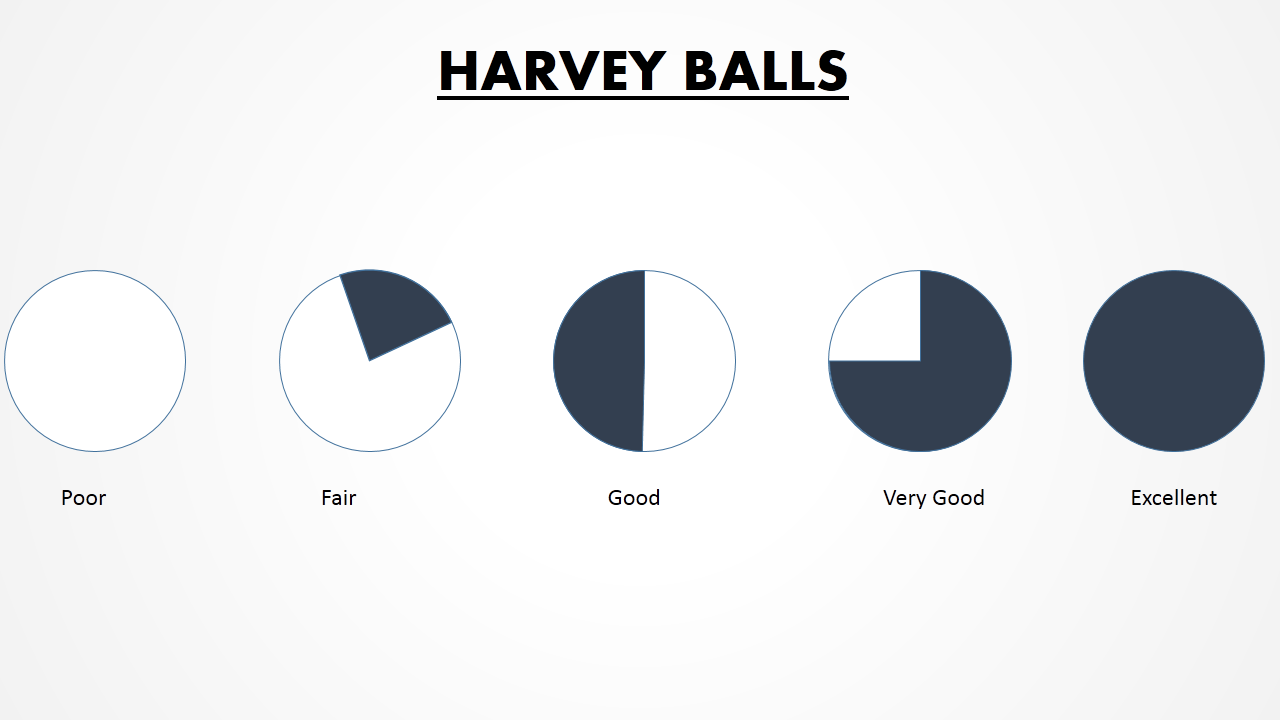A needs assessment is a means through which a company gains crucial insights into its current position, to ascertain its corporate efficiency. Such an assessment can be greatly helpful when a company plans to redefine its objectives and search for ways to improve its working.
There are many areas where the concept of needs assessment is used in the corporate world, to great impact. An organisation wanting to beat competition with the goal of attracting new customers could employ a needs assessment template, where it uses data, and concepts, to better its own position in the market.
Everyone knows that risk assessment is another foundational tenets of good business. If you’re looking for a hand in this area, here are five risk assessment frameworks to help you. Click here to access these.
When a company’s leaders have a clearer perception of its strengths and weaknesses, they can carve out the right path for the organization and define appropriate goals.
PPT Presentations, well-designed and content ready, are one of the best mediums through which such an exercise could be carried out within a corporate space. With a clean, effective PPT Presentation, one can better examine the inner machinery of a company and help convey a statement of progress to stakeholders.
In this blog, we’re going to study ten needs assessment templates with samples and examples. As always, each of these templates is 100% editable and customizable to give you structure as well as flexibility as a business offering. You will not find this unique combination, anyone else.
Template 1: Tactical Planning Needs Assessment PPT Presentation
This 51-slide complete deck PPT Template has been made to exhaustively cover vital points of the subject. Use this presentation template to present an agenda, gap analysis overview, its procedure, graph, mission, etc. A graph displaying the current state analysis company goals is deployed in the middle of the presentation, followed by a basic gap analysis chart, its template, a skills gap analysis template and a growth share matrix as well.
Template 2: Training Process Needs Assessment Design Delivery
Equip yourself with a slide that’s technically on-point, and visually so attractive despite being filled with such an array of information. The dashboard includes four key subheadings – training needs assessment, training design, training delivery and evaluation. Download now to showcase your expertise in designing delivery of training, after a careful, brilliant assessment of needs.
Template 3: Market Segment Assessment Competitive Assessment
Understanding the market and evolving with it is key to growing a successful business. Here is a template that fits this purpose to a T. Its design, white background contrasted against blue and green colors, with the subheadings ‘market segment assessment’ and ‘competitive assessment’ presented in a linear structure on the left side of the slide gives it a life of its own. Get it now to prepare yourself to win clients and tremendous recall value.
Template 4: GAP Analysis tool SWOT Analysis Needs Assessment
Strengths, weaknesses and opportunities are buzzwords in the business world. This template aims to make the most of the concept with a SWOT analysis graph that lends you some perspective on your place in the market. Colorfully rendered and animated, the slide is divided into four segments, with each segment respectively titled ‘strengths’, ‘weaknesses’, ‘threats’ and ‘opportunities’. Your findings can really be path-defining for a business, and when presented to an audience can have a real impact.
Template 5: Skills GAP Analysis Template Tactical Planning Needs Assessment
Leverage this slide to gain a stronger understanding of skill levels within your teams and work according to them. The template has a neat design, with a graph that includes the metrics, the building blocks of learning manufacturing, managing the learning factory, planning learning and management, rapid set up, scheduling strategies, inventory record accuracy, peak performance teams, common sense Six Sigma, management problem solving, work cell design and high reliability maintenance. Use this template to present a holistic view of the knowledge you have gained in skill management and completing it to ensure your business is always working at full productivity.
Template 6: Four-phase Training Needs Assessment System
A thorough implementation of needs assessment helps you manage your corporate systems better and ensure better organizational efficiency. This template aims to help you achieve that. Apart from being slick in design and pleasing to the eye, it has four phases structured in a linear model, each one titled, analyze, design, develop and implement.
Template 7: GAP Analysis Tool McKinney 7s Tactical Planning Needs Assessment
Give your audience a neat presentation that props up the essentials of your business with this template. The variables presented are stacked vertically, with structure, style, staff, skills, systems and strategy forming the core of the slide, along with shared values located at the top of the dashboard.
Template 8: GAP Analysis Graph Tactical Planning Needs Assessment
Make an accurate measurement of your business’s potential along with its desired objects with the aid of this GAP analysis template. The focus of the slide is a graph that measures revenue against a range of metrics – potential performance, diversification, product development, market growth, market penetration and actual performance. Grab this slide now and customize it as you see fit!
Template 9: GAP Analysis Overview Tactical Planning Needs Assessment
Deploy this creatively rendered GAP analysis template to enhance your business. The slide depicts an arrow of progress, with ‘Current stage – where are we now’ at the tail of the arrow and the ‘Desired State – where do we want to go’ present at the head. At the central region of the arrow, you can showcase your needs assessment expertise with columns to what to do and how to do it to get there. This is akin to the operational part of a business, the everyday buzz/work we see at workplaces around the world.
Template 10: The How of Tactical Planning Needs Assessment
Organize your corporate plans and objectives with the aid of this sophisticated looking template. The dashboard lays out a graph with the subheadings, plan, act, check and do, against a series of steps that includes gap identification, cause investigation and select action. This presentation template blends a clean design with visually-pleasing graphics.
Template 11: Tactical Planning Needs Assessment PPT
This template helps you organize information into three separate pockets, with the silhouette of an employee located beside each pocket to make a more eloquent statement. The slide has a full white background, contrasted with blue and pink shades to have that visual feel of a business planning process in action; always on the move, if you may.
FAQs on Needs Assessment
What are the three components of a needs assessment?
Initiation, data collection and analysis, and final production are the three essential parts of a needs assessment plan. The initiation phase aims to locate core areas within the assessment project of the organization being scrutinized. Following this comes the data collection and analysis stage, where an organizational review is conducted through interviews, surveys and an assessment of existing documentation to arrive at a cohesive understanding of the market position of the organization. Lastly, the final product phase, where a condensed summation of the findings is laid out, including the corporate forces that need to be strengthened and the ones that need to be limited.
What are the five steps in the needs assessment?
1 – Define the broader needs of the organization: To initiate the process, assess how the company performs at present. A review of the current financial and market standing of the company is required.
2 – Designate the resources: As part of the next step, you would need to consider the resource constraints of the company, and work to frame the procedure around the limitations, if and wherever these are present. If there are operational constraints like shortage of staff or employees, develop solutions to tackle the same.
3 – Gather information internally: Accumulate a wealth of internal information to understand the company’s current needs. Data can be acquired from multiple avenues of the same company, including internal documents relating to revenue, funding and more.
4 – Gather information from outside sources : Information needs to be obtained from sources outside of the organization. This is vital to understanding the company’s position vis-à-vis competition, and gives you insights into how to gain an market edge over competitors.
5 – Use the data you've gathered: Finally, organize raw data in a manner that effects changes within the company’s work-spheres, and allows solutions to be developed for the problems detected through the assessment.
What are the types of needs assessments?
- Questionnaires: Interviews and questionnaires are the most widely used methods for gathering data. A questionnaire forms the most basic kind of inspection, composed of broad ‘yes’ or ‘no’ questions for your audience.
- Surveys: Surveys are employed in many organizations to acquire in-depth information around areas, such as customer experience. Unlike questionnaires, surveys typically comprise questions that are open-ended, allowing the audience to provide more detailed answers. Surveys can help organizations gather more accurate information, although it is less time-efficient.
- Focus groups: Focus groups are interviews where individuals participate. Although this model of assessment requires substantially more time than the earlier two methods, the information gathered here is more extensive and reliable than through the other two methods.





 Customer Reviews
Customer Reviews


















